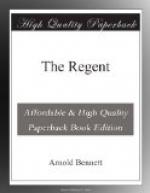As he looked about him, at the rich table, and at the glittering chandelier overhead (albeit the lamps thereof were inferior to his own), and at the expanses of soft carpet, and at the silken-textured walls, and at the voluptuous curtains, and at the couple of impeccable gentlemen in-waiting, and at Joseph, who knew his place behind his master’s chair—he came to the justifiable conclusion that money was a marvellous thing, and the workings of commerce mysterious and beautiful. He had invented the Five Towns Thrift Club; working men and their wives in the Five Towns were paying their twopences and sixpences and shillings weekly into his club, and finding the transaction a real convenience—and lo! he was entertaining celebrities at Wilkins’s.
For, mind you, they were celebrities. He knew Seven Sachs was a celebrity because he had verily seen him act—and act very well—in his own play, and because his name in letters a foot high had dominated all the hoardings of the Five Towns. As for Rose Euclid, could there be a greater celebrity? Such was the strange power of the popular legend concerning her that even now, despite the first fearful shock of disappointment, Edward Henry could not call her by her name without self-consciously stumbling over it, without a curious thrill. And further, he was revising his judgment of her, as well as lowering her age slightly. On coming into the room she had doubtless been almost as startled as himself, and her constrained muteness had been probably due to a guilty feeling in the matter of passing too open remarks to a friend about a perfect stranger’s manner of eating artichokes. The which supposition flattered him. (By the way, he wished she had brought the young friend who had shared her amusement over his artichokes.) With regard to the other two men, he was quite ready to believe that Carlo Trent was the world’s greatest dramatic poet, and to admit the exceeding talent of Mr. Marrier as a theatrical manager.... In fact, unmistakable celebrities, one and all! He himself was a celebrity. A certain quality in the attitude of each of his guests showed clearly that they considered him a celebrity, and not only a celebrity but a card—Bryany must have been talking—and the conviction of this rendered him happy. His magnificent hunger rendered him still happier. And the reflection that Brindley owed him half-a-crown put a top on his bliss!
“I like your dressing-gown, Mr. Machin,” said Carlo Trent, suddenly, after his first spoonful of soup.
“Then I needn’t apologize for it!” Edward Henry replied.
“It is the dressing-gown of my dreams,” Carlo Trent went on.
“Well,” said Edward Henry, “as we’re on the subject, I like your shirt-front.”
Carlo Trent was wearing a soft shirt. The other three shirts were all rigidly starched. Hitherto Edward Henry had imagined that a fashionable evening shirt should be, before aught else, bullet-proof. He now appreciated the distinction of a frilled and gently flowing breast-plate, especially when a broad purple eyeglass ribbon wandered across it. Rose Euclid gazed in modest transport at Carlo’s chest.




